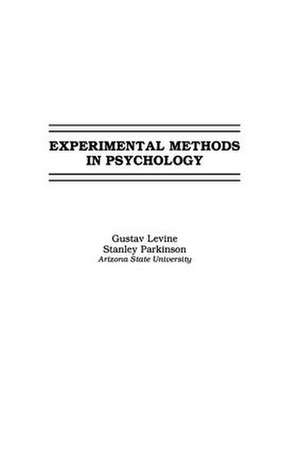Experimental Methods in Psychology
Autor Gustav Levine, Stanley Parkinsonen Limba Engleză Paperback – 22 iun 2016
Unique features of this text include:
* a detailed discussion of the process of theorizing, coupled with a close examination of psychological constructs, offers the reader an opportunity to see how psychologists think about, develop, and modify their theories, and the part played by research in changing explanations of behavior.
* Although it is common for psychologists to be self-conscious in their reasoning, it is uncommon to see an analysis of the logic that they use to draw conclusions. Presenting material that is rarely verbalized but readily acknowledged by experienced researchers, the text contains an overt analysis of the logic of drawing conclusions from research.
* Instructors are given a choice among 15 chapters to focus on or combine to suit the course's concentration. For example, instructors have the option of focusing on experimental psychology or a broad-based course including material on research methods in experimental, social, clinical, and applied psychology.
* Courses in experimental psychology or research methods are required for every psychology major. Statistical understanding is vital for this curriculum, and this text contains a comprehensive chapter on statistics making it ideal for courses that combine statistics and experimental methods.
Other important coverage includes:
* an all-inclusive summary of the material found in an introductory statistics class. Although courses in research methods and experimental psychology usually have a statistics prerequisite, the students rarely remember the material when entering the research course. This text provides the instructor with the option of simply assigning the statistics information as a review, rather than repeating the lectures. If the course requirements are such as to necessitate a joint statistics and research methods course -- with the instructor lecturing on both topics -- this text could serve as the single text for the course. A helpful discussion -- accompanied by a valuable table -- demonstrates how to choose an appropriate statistic. All necessary formulas and other familiar statistical procedures -- illustrating computational steps -- are also featured.
* a detailed discussion of how to develop tests for use in research. Aside from the value of this information for any researcher, it can be particularly helpful to students who are required to develop original experiments.
* an elaborate discussion of methodological issues in outcome research, using smoking cessation and weight reduction programs as examples.
Test bank disks for Experimental Methods in Psychology, -- free to adopters -- consist of an average of six short-answer, 11 fill-in-the-blank, and 11 multiple-choice questions for each chapter. The files are in both ASCII and Word-for-Windows formats.
| Toate formatele și edițiile | Preț | Express |
|---|---|---|
| Paperback (1) | 445.79 lei 43-57 zile | |
| Taylor & Francis – 22 iun 2016 | 445.79 lei 43-57 zile | |
| Hardback (1) | 1012.10 lei 43-57 zile | |
| Taylor & Francis – noi 1993 | 1012.10 lei 43-57 zile |
Preț: 445.79 lei
Nou
Puncte Express: 669
Preț estimativ în valută:
85.33€ • 92.72$ • 71.72£
85.33€ • 92.72$ • 71.72£
Carte tipărită la comandă
Livrare economică 21 aprilie-05 mai
Preluare comenzi: 021 569.72.76
Specificații
ISBN-13: 9781138969322
ISBN-10: 113896932X
Pagini: 490
Dimensiuni: 152 x 229 mm
Greutate: 0.68 kg
Ediția:1
Editura: Taylor & Francis
Colecția Psychology Press
Locul publicării:Oxford, United Kingdom
ISBN-10: 113896932X
Pagini: 490
Dimensiuni: 152 x 229 mm
Greutate: 0.68 kg
Ediția:1
Editura: Taylor & Francis
Colecția Psychology Press
Locul publicării:Oxford, United Kingdom
Public țintă
ProfessionalCuprins
Contents: Preface. Introduction: The Function of Research Methods. Variables: Thinking of the World in Terms of Relationships Between Variables. Rules for Research: A Brief Checklist of Things to Consider for a Credible Experiment. Single-Factor Designs: Simple Experimental Designs That Incorporate the Rules for Research. Statistical Logic and Choosing a Statistic: An Overview of the Role of Statistics in Psychological Research. Multifactor Designs: Designing and Interpreting Experiments with Multiple Influences. The Logic of Experimental Psychology: The Problems Encountered in Theorizing About Internal Events. Detection, Discrimination, and the Theory of Signal Detection. Evolution of a Theoretical Construct: Changes in the Construct of Iconic Memory Over 30 Years of Research. Testing Theory I: A Close Look at the Methods and Logic Used in Evaluating a Theory of Short-Term Memory Search. Testing Theory II: A Close Look at the Methods and Logic Used in Evaluating a Theory of Visual Search and Attention. Applied Experimental Psychology: Examples of the Kinds of Questions Asked, and Experiments Done, When the Focus Changes from Theory to Application. Social Psychology I: Testing Theories When Internal Events Can Be Monitored or Manipulated. Social Psychology II: The Measurement of Attitudes and Construction of Tests for Research. Clinical Psychology: The Research Problems Encountered, and Procedures Used, in Treatment Outcome Research. Appendices: The Proper Form When Submitting Experiments for Publication. Statistical Tables.
Recenzii
"An interesting and unusual book....There are excellent chapters on the construction of different types of scales for attitude measurement and on clinical outcomes research... Strongly recommended."
—CHOICE
"The author's emphasis on the ways of scientific thinking provides an excellent window into psychological research. The clear organization of the text makes its high-level content easy to read."
—Contemporary Psychology
—CHOICE
"The author's emphasis on the ways of scientific thinking provides an excellent window into psychological research. The clear organization of the text makes its high-level content easy to read."
—Contemporary Psychology
Notă biografică
Gustav Levine, Stanley Parkinson







